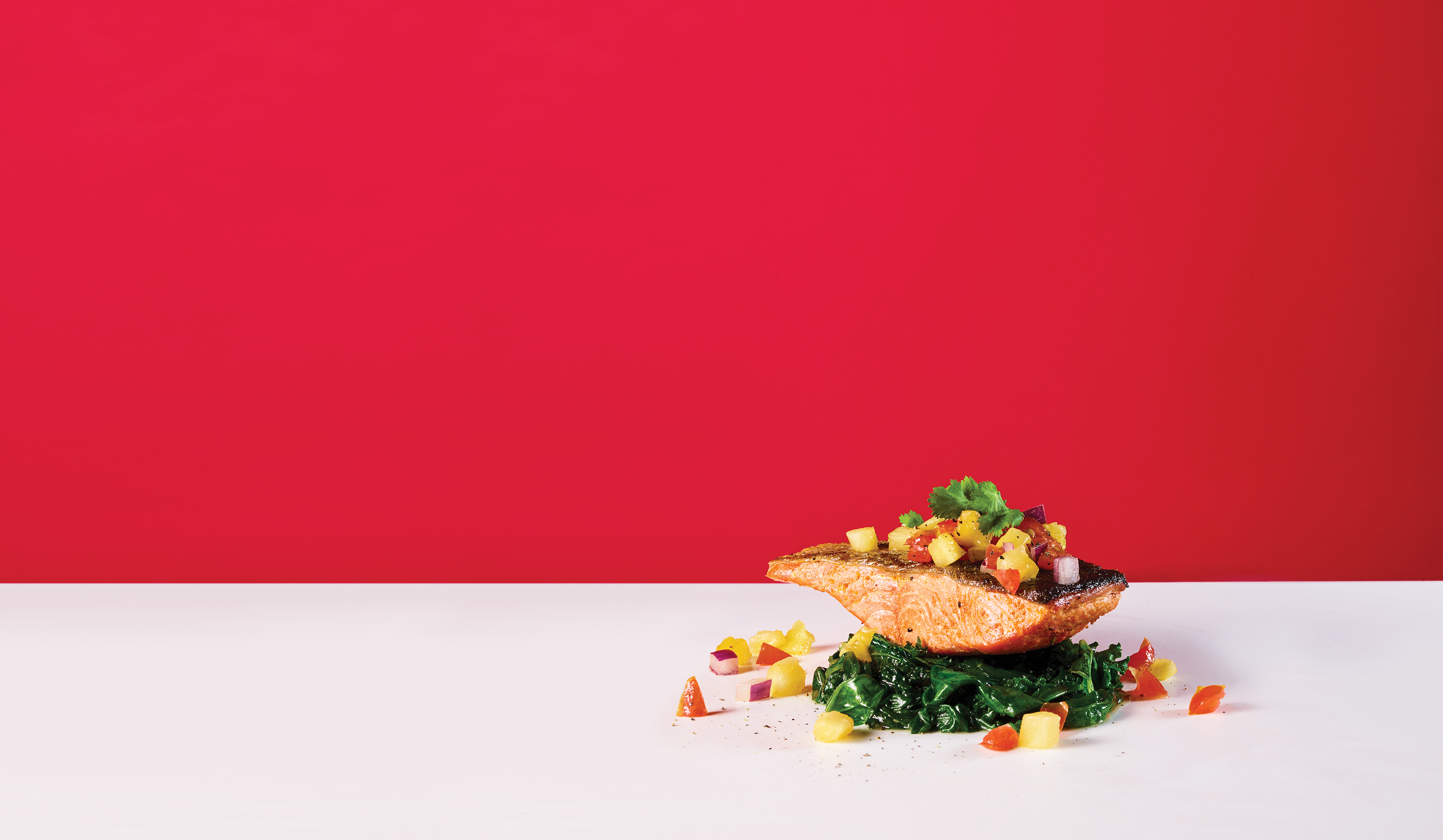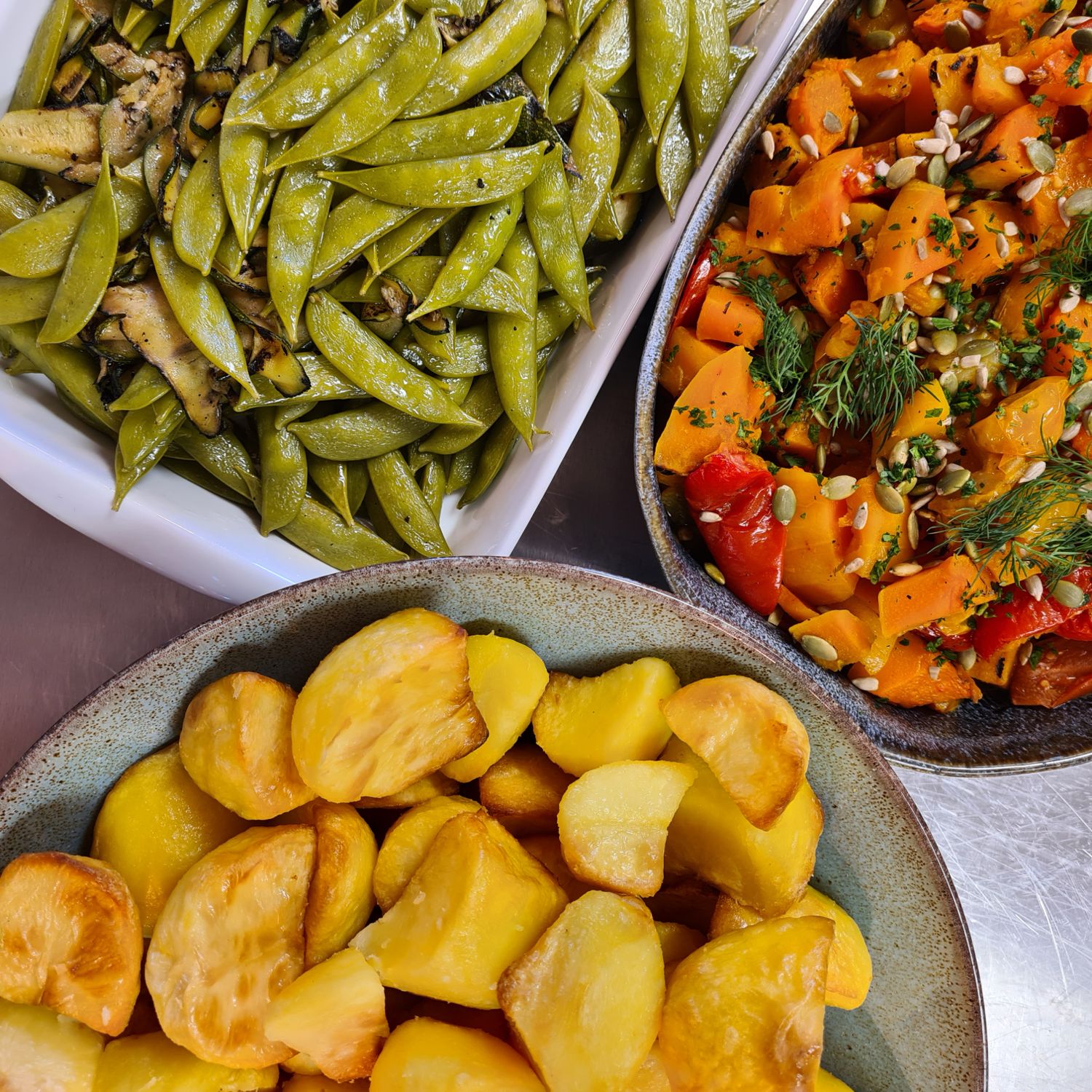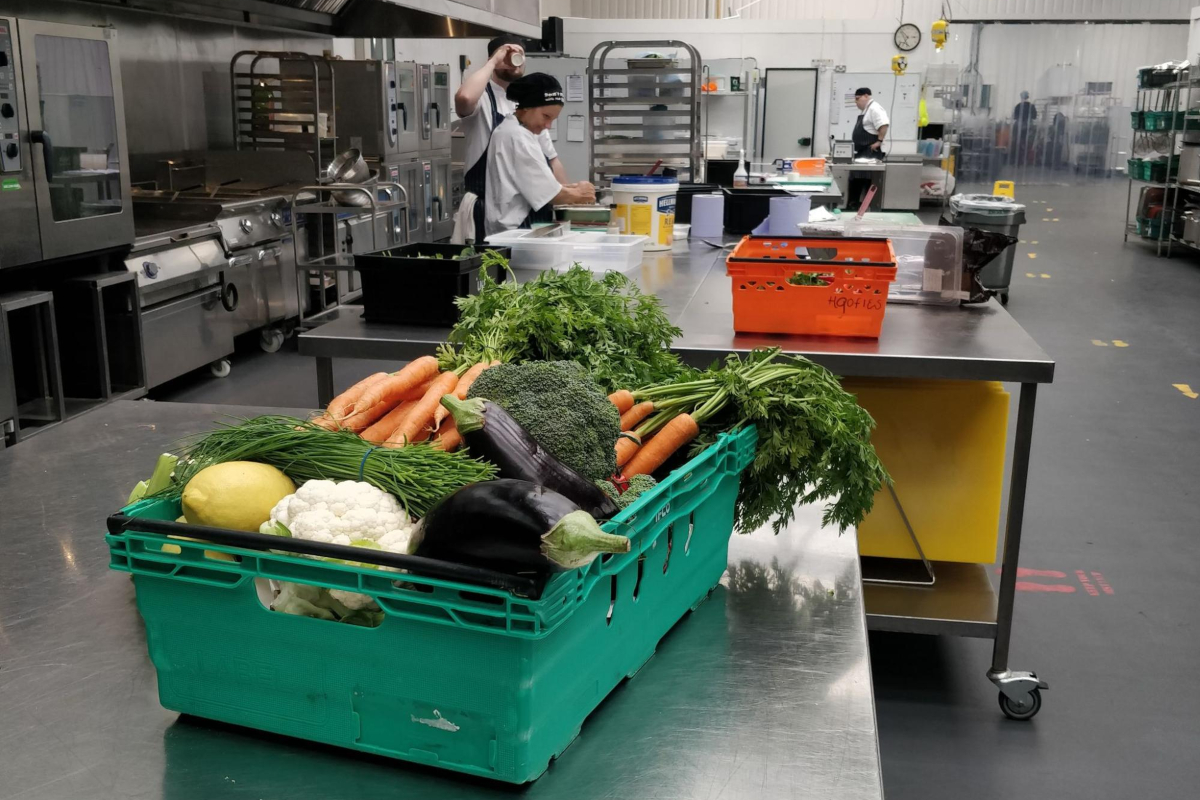From smoked salmon bagels to hearty fish pies, our chefs love putting seafood on the menu every day. Therefore we’d be remiss not to reflect on the environmental impact of eating seafood.
In this article, we’ve been mindful that seafood is not without controversy. ‘Seaspiracy’ on Netflix, released in 2021, brought to light the many issues surrounding the seafood supply chain. Though we can’t say we’re 100% on board with all the documentary’s opinions, it does well to emphasise the need for change. That’s why you’ll only find the hard facts here, aimed at equipping you with the tools to help you enjoy seafood responsibly.
Why eat seafood?
Reduces carbon emissions
So if you’re following a plant-based diet – great! Eating plant-based proteins can be a good way to reduce your carbon footprint. However, if you’re a meat eater, incorporating seafood into your diet is a better way to get protein and reduce your carbon footprint. Here’s how farmed fish compares to other land-based animal produce across the supply chain:
- Beef creates 614% more carbon emissions (25 kgCO2eq)
- Lamb creates 471.5% more carbon (20 kgCO2eq)
- Farmed Shrimp creates 261% more carbon (10 kgCO2eq)
- Cheese creates 140% more carbon (8.4 kgCO2eq)
- Pork creates 86% more carbon (6.5 kgCO2eq)
- Chicken creates 23% more carbon (4.3 kgCO2eq)
- Eggs create 8.5% more carbon (3.8 kgCO2eq)
This data is sourced from Joseph Poore and Thomas Nemecek (2018), where they have found that eating 100g of farmed fish creates an equivalent of 3.5 kg of CO2 emissions (on average). All comparisons here are based on 100g portions of each protein listed.
But how does this data challenge common perceptions?
This data is a textbook example of how it can get complicated to eat in a less carbon-intensive way. There are common ‘rule of thumb’ approaches to sustainable eating that won’t always match up to reality. For example, seafood is generally a less carbon-intensive option, but there are exceptions! Eating farmed shrimp or cheese creates more carbon emissions than pork (extra points for those who already knew).
The facts can differ from our preconceived ideas when choosing ingredients responsibly. Whilst farmed fish is better for your carbon footprint than most meats, some kinds of seafood (we’re looking at you, farmed shrimp) can turn out to be worse. It’s also worth noting that some food items will have different carbon emissions based on how responsibly and locally they were sourced. We hope the following sections of this article will help you navigate these choppy waters.
But first, here’s how seafood can support your healthy lifestyle…
There’s an island in Japan, Okinawa, where residents can expect to live considerably longer lives based on a healthier diet that swaps out meat for fish, fruit and veg. In short, seafood has less saturated fat than meat, which improves your blood cholesterol and results in a healthier heart (amongst many other reasons).
Eating like an Okinawan, with lots of fresh fish, can work wonders in supporting a healthier lifestyle. The UK could be healthier with a lighter carbon footprint if meat eaters switched to eating more fish. It’s a win/win for you and the planet. That is, once you master the art of choosing the right seafood for your plate.
So, how can we eat seafood more responsibly?
Eating in an affordable, delicious and sustainable way can sometimes be a challenge. So, to help, we’ve found two easy-to-follow ways to eat seafood with less damaging environmental impact:
Use the MCS’ Good Fish Guide
The MCS (in other words, the Marine Conservation Society) will tell you exactly how sustainable a fish is to eat. Their ‘Good Fish Guide’ rates pretty much any fish you can find at a supermarket or restaurant and will provide you with a sustainability rating (as well as providing better alternatives). More importantly, the guide lets you understand how location and fishing (or farming) methods affect the overall sustainability of the fish.
Check it out
Psst. They’ve got an App too, to help you make the right choice on your next trip to the fish counter.
The Fooditude Way:
At Fooditude, we work closely with Daily Fish, our supplier to ensure that all the fish we source is rated 1-3 on the MCS Good Fish Guide. This means we never serve any fish rated 4-5, which MCS recommends avoiding.
Menu case study:
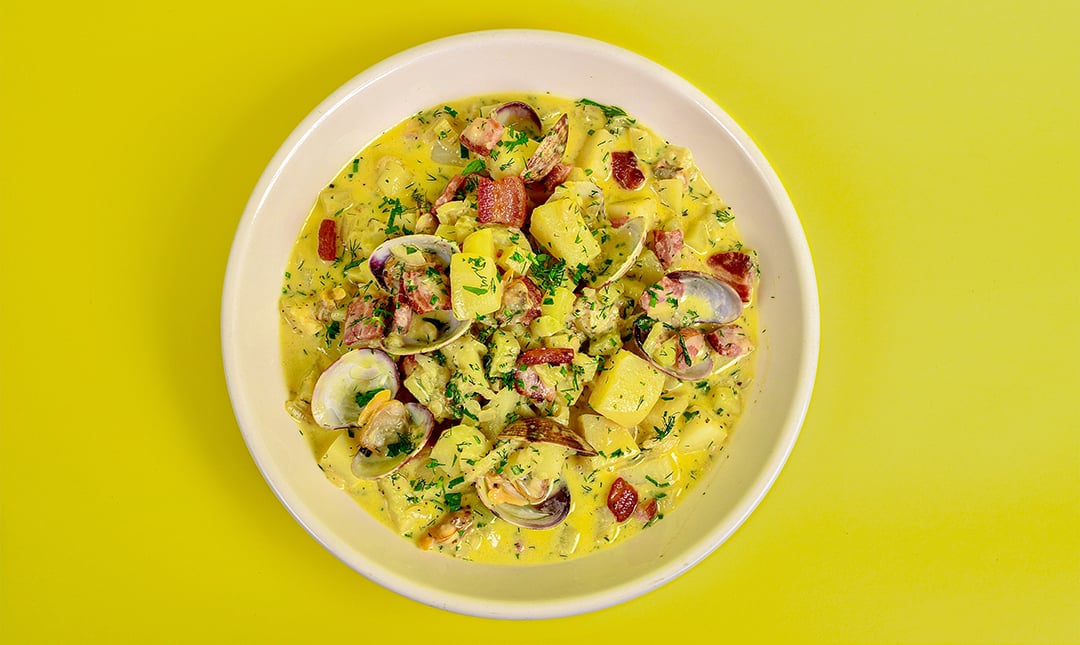
Dorset clams, Dingley Dell bacon & broccoli stem, white wine cream sauce
This dish qualifies as a Sustainable Restaurant Association ‘One Planet Plate’, which addresses the inherent problems in our food system. The Dorset clams we use are rated a ‘1’ in the MCS Good Fish Guide, therefore, considered the best choice for sustainable seafood. Fooditude’s Chef Susi, Head of Food Development & Innovation, commented on the dish:
“Farmed shellfish is a great option. Unlike farmed fish, clams, mussels and oysters don’t need any feed and actively clean the water they’re grown in. They’re a great choice in terms of environmental sustainability and a low carbon option to boot.”
Avoid the ‘Big Five’
It’s time we diversified the seafood that’s on our plate! 80% of the seafood we eat in the UK is made from just 5 species: cod, haddock, salmon, tuna and prawns. But what’s the problem with always choosing our fishy favourites? Most of our demand for seafood falls on them, which makes the pressure exerted on these species unsustainable.
Instead, we need to spread our demand for seafood in line with marine biodiversity. For example, opt for smoked rainbow trout instead of smoked salmon for your Sunday brunch. Not only does it have a less salty and delicate taste, but trout farmed in freshwater also avoids many environmental pitfalls of other fishing methods.
It can seem overwhelming when choosing to cook seafood you’ve never tried before. But don’t panic! Just because a fish isn’t (currently) part of the UK’s most common seafood choices, doesn’t mean it’s challenging to cook.
One of our favourite podcasts with Chef Angela Hartnett, discusses how strange it is that the UK exports a lot of its fish to Europe, including species we never eat at home. But when Brits go on holiday and try new (UK!) fish species abroad – they love it. We could start cooking so many of these delicious dishes, and enjoy them at home! So break your shopping list routine with something different, such as hake or sardines to add a little extra variety to your cooking.
The Fooditude Way:
On our current menu, 50% of the seafood we serve is from the Big Five fish selection, whilst the other 50% uses other fish species. Whilst we’ve got room for improvement, this beats the national 80% average consumption of the Big Five. If we introduce different ways of eating seafood in the office canteen, we can inspire people to eat differently in their homes too.
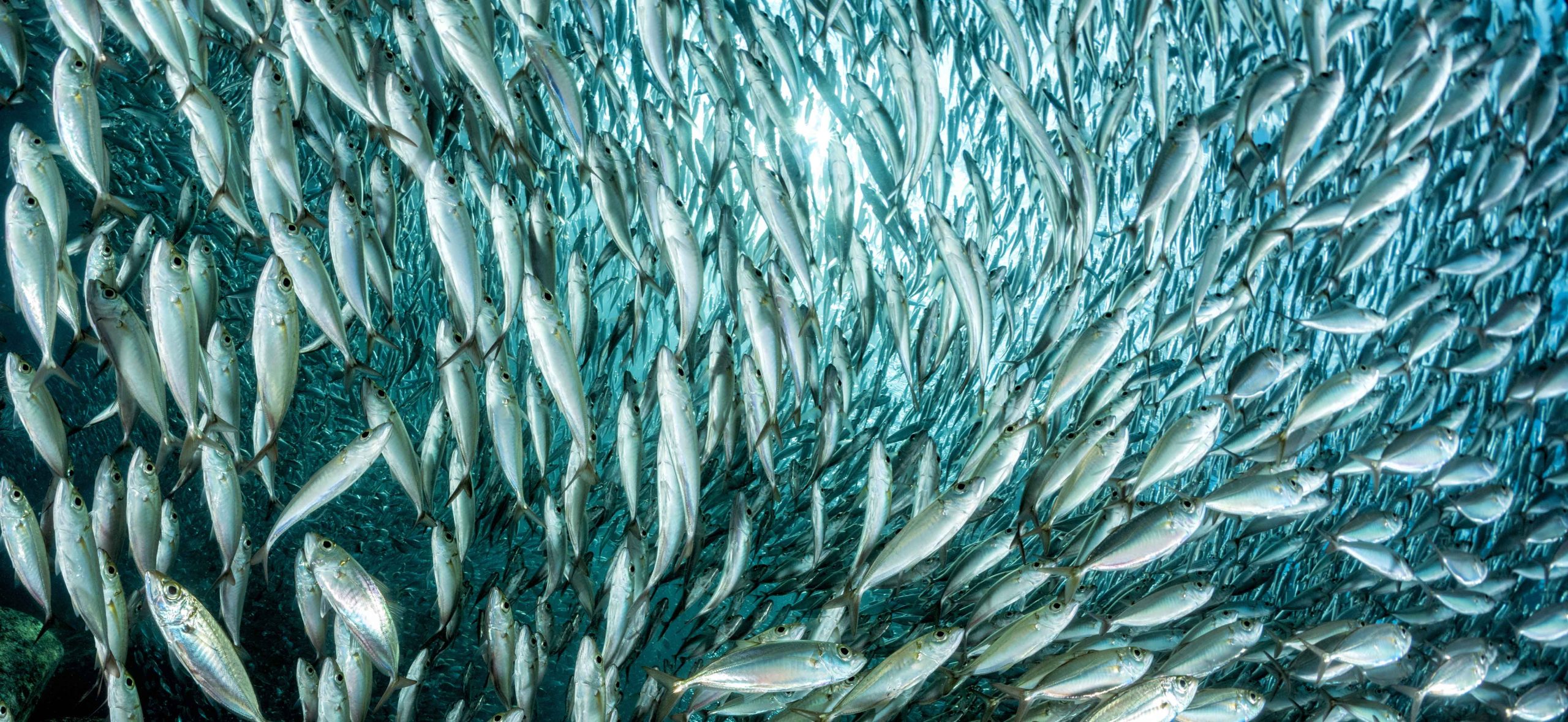
It’s a wrap:
Don’t let perfect be the enemy of good. So when you’re trying to eat in a more environmentally responsible way, it’s important to remember that every meal we eat will have some level of environmental impact on the planet.
At Fooditude, we’re always looking for new ways to improve the sustainability of our food, and there is still plenty more we have ambitions for. Of course, it takes time to find a way to deliver top-notch catering services that minimise environmental damage. But little by little, with each improvement, we are learning (and investing) in feeding people in a better way for people and the planet.
So, when it comes to eating seafood sustainably, it’s essential to remember that sustainable eating with every meal is tricky. But, equipped with the MCS Good Fish Guide and some culinary creativity, we’re one step closer to mindful and informed consumption. We hope you’ll join us on our voyage to a more sustainable food system.
Psst. Got an appetite for some more sustainability insights? Follow us on LinkedIn, where we’ll celebrate important sustainability dates (such as World Oceans Day) and share top-notch resources. You can find out more about Fooditude’s sustainability mission on our website.
Co-written by Anouk Dijkman and James Ricketts
